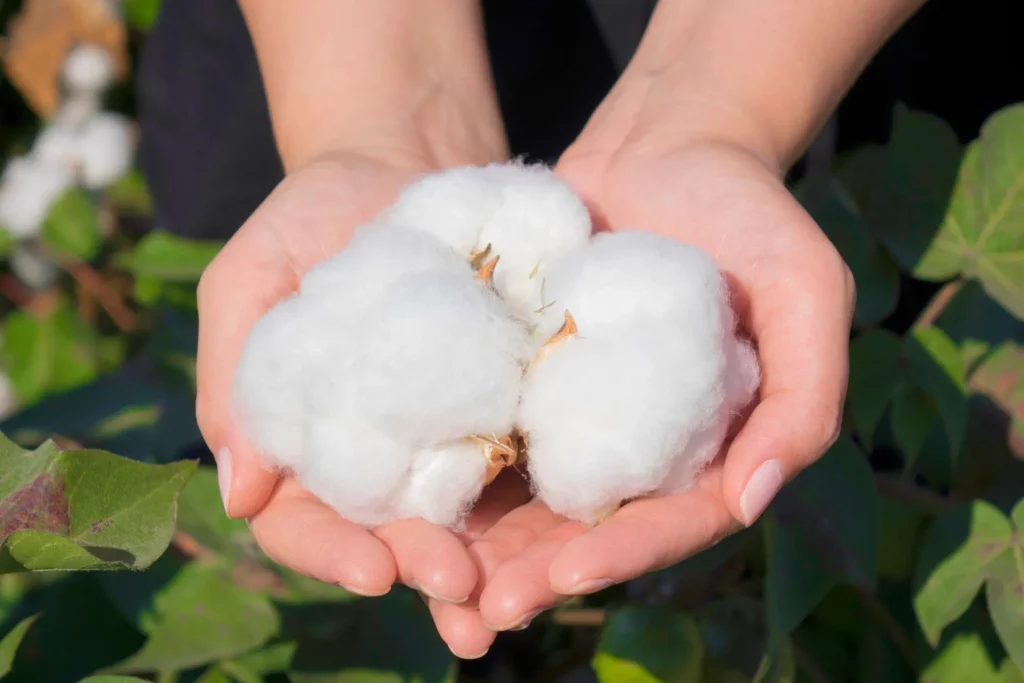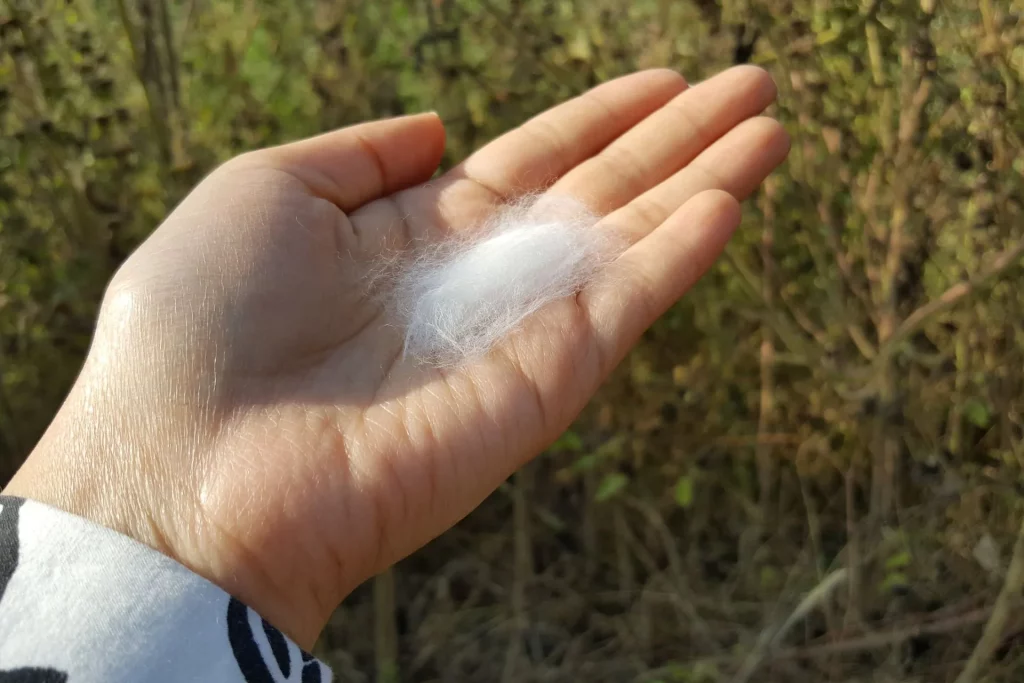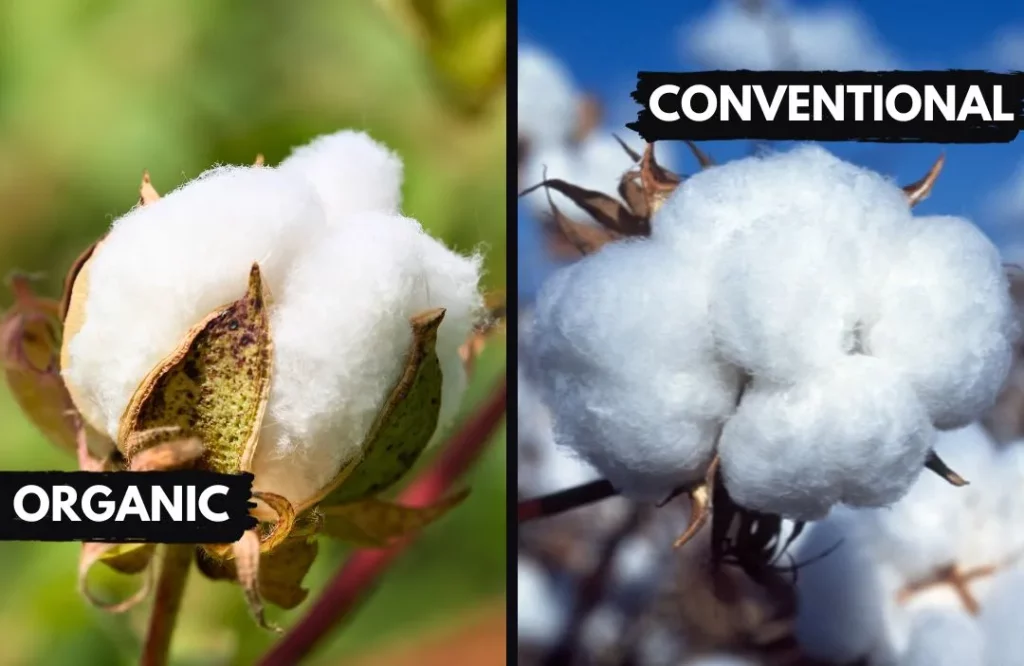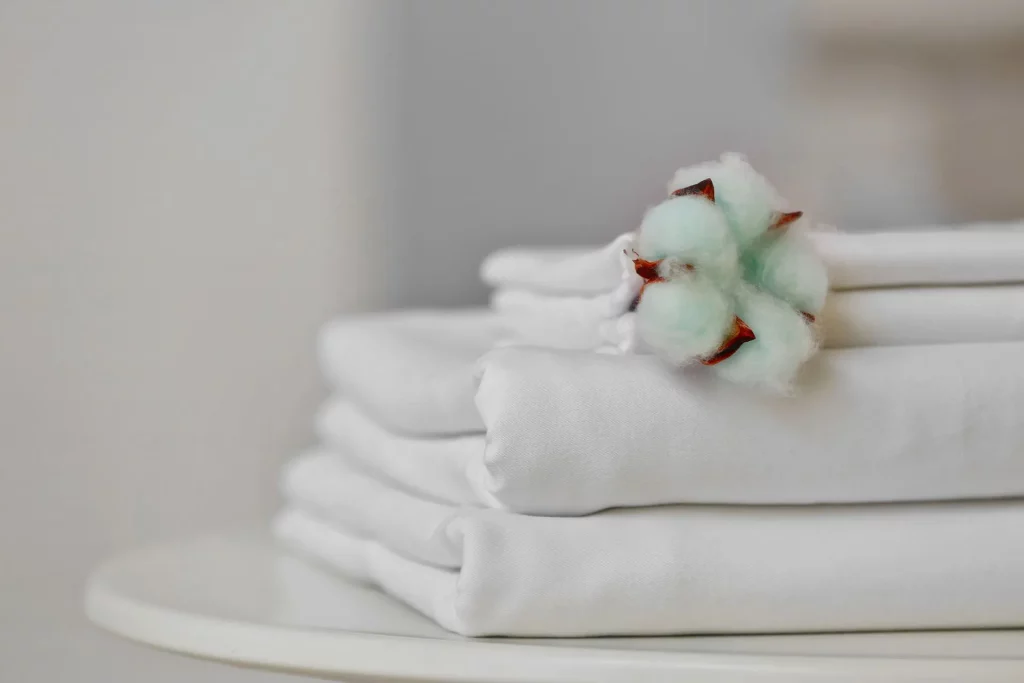When it comes to selecting textiles for clothing, home furnishings, and more, the choice between organic cotton and conventional cotton has gained increasing attention. Are you inadvertently wearing the weight of environmental impact, or are you draped in conscious choices?
Join us to uncover the surprising truth about the fabrics in your life and how your choices can shape a brighter, sustainable future. Let’s transform your wardrobe into a canvas of conscious living, one stitch at a time. Explore the world of organic cotton vs. Conventional cotton, discovering their unique qualities and environmental impact.
Table of Contents
Organic Cotton: A Green Revolution

First, let’s demystify the term ‘organic cotton.’ Organic cotton is cultivated using methods that exclude chemical pesticides and genetically modified organisms. It’s all about keeping it clean and green from seed to shelf.
Environmental Advantages:
-
Reduced Pesticide Use: Organic cotton champions reducing harmful pesticides and chemical fertilizers. This practice safeguards both the environment and those working in the cotton fields.
-
Soil Health Preservation: Organic farming techniques, such as crop rotation and composting, preserve soil fertility, ensuring future generations can reap its benefits.
Health Benefits:
-
Non-Toxic Textiles: Organic cotton products are free from chemical residues, making them a safe and comfortable choice, particularly for individuals with sensitive skin.
-
Safer Conditions for Farmers: By shunning toxic chemicals, organic cotton farming promotes safer working conditions for the farmers who toil in the fields.
Conventional Cotton: The Dark Side of Comfort:

Conventional cotton, the incumbent in the textile world, relies heavily on chemical interventions. This industry has long thrived, but at what cost?
Environmental Drawbacks:
-
Pesticide Pollution: The widespread use of pesticides in conventional cotton farming poses a serious threat to ecosystems and water sources.
-
Soil Degradation: The overuse of chemicals can degrade soil quality and hinder biodiversity.
Health Concerns:
-
Chemical Residues in Clothing: Conventional cotton products may contain residues of pesticides and chemicals, potentially exposing wearers to health risks.
-
Risks to Cotton Farmers: Farmers in the conventional cotton industry face occupational hazards due to prolonged exposure to harmful chemicals.
What Is the Main Difference Between Organic Cotton vs. Conventional Cotton?

The difference between organic and regular (conventional) cotton lies primarily in how they are grown and processed. Here is a breakdown of the key distinctions:
Farming Practices:
-
Organic Cotton: Organic agricultural practices, which avoid the use of petrochemical pesticides, insecticides, and modified organisms, are used to cultivate organic cotton. Instead, it makes use of natural pest control methods, crop rotation, and composting to maintain the soil’s fertility.
-
Regular (Conventional) Cotton: Conventional cotton farming often involves using artificial pesticides, insecticides, and GMO seeds to maximize yield and control pests. Chemical fertilizers are also commonly used in conventional cotton farming.
10 Compelling Reasons Why Organic Cotton Outshines Conventional Cotton:
Certainly, there are several reasons why organic cotton is often considered better than conventional (normal) cotton:
1. Environmentally Friendly Farming Practices:
Chemical pesticides, insecticides, or GM organisms are not used in the production of organic cotton. Reducing the release of dangerous compounds into the environment enhances ecosystem health.
2. Preservation of Soil Fertility:
Crop rotation and composting are two examples of organic farming techniques that preserve soil fertility and stop deterioration, guaranteeing that the land will continue to be productive for future generations.
3. Reduced Water Pollution:
The absence of synthetic chemicals in organic cotton farming minimizes water pollution, safeguarding local water sources and aquatic life.
4. Healthier for Farmers:
Organic cotton farming typically provides safer working conditions for farmers who are not exposed to harmful chemicals, reducing the risk of health issues.
5. Non-Toxic Textiles:
Organic cotton products are free from chemical residues, making them a safer and more comfortable choice, especially for individuals with sensitive skin or allergies.
6. Support for Sustainable Practices:
Choosing organic cotton encourages sustainable farming practices and contributes to a more environmentally responsible and ethical industry.
7. Global Organic Certifications:
Many organic cotton products are certified by organizations like GOTS (Global Organic Textile Standard) or USDA Organic, providing assurance of their authenticity.
8. Consumer Demand:
Growing awareness of environmental and health concerns has led to increasing consumer preference for organic cotton products.
9. Reduced Pesticide Use:
You may help reduce the use of artificial pesticides, which can have harmful impacts on the environment and human health, by choosing organic cotton.
10. Aligning with Values:
For individuals and businesses committed to sustainable living and ethical consumption, organic cotton aligns with their values and contributes to a greener, more responsible future.
These reasons collectively demonstrate why many people consider organic cotton to be a better choice over conventional cotton for a variety of personal, environmental, and ethical reasons.
Organic Cotton vs. Conventional Cotton – A Side-by-Side Comparison
Understanding the differences between organic and conventional cotton is essential for making informed choices as a conscious consumer. The following table provides a clear and concise comparison of key aspects, from farming practices to environmental impact, helping you decide which type of cotton aligns with your values and preferences.
| Aspect | Organic Cotton | Conventional Cotton |
|---|---|---|
| Farming Practices | Grown without artificial pesticides and GMOs. | Relies on artificial pesticides and GMO seeds. |
| Environmental Impact | Reduced pesticide use, less harm to ecosystems. | Widespread pesticide use harms ecosystems. |
| Soil Health | Soil fertility is preserved through organic methods. | Soil degradation due to chemical overuse. |
| Health Benefits (Clothing) | Non-toxic, safe for sensitive skin. | It may contain pesticide residues and potential health risks. |
| Health Benefits (Farmers) | Promotes safer working conditions. | Farmworkers face health risks due to chemical exposure. |
| Market Availability | Increasing demand, available from various brands. | Widespread availability in most retail stores. |
| Price | It can be slightly more expensive. | Generally more affordable, but price depends on brand and quality. |
| Certifications | GOTS, OEKO-TEX, USDA Organic, etc. | May lack specific organic certifications. |
| Sustainability Impact | Supports sustainable farming practices. | Contributes to environmental degradation. |
| Consumer Demand | Growing preference among eco-conscious consumers. | Traditional choice for many shoppers. |
How to Care of Cotton Sheets?

Caring for your cotton sheets, especially if they are organic, is essential to maintain their quality, longevity, and comfort. Here are some tips on how to care for your cotton sheets:
- Check the Care Label:
Before anything else, make sure you read the care label on your cotton sheets. There may be different care guidelines for various cotton brands and varieties.
- Washing:
-
Use a mild, eco-friendly detergent to wash your sheets. Avoid harsh chemicals and bleach, as they can weaken the fibers and reduce the lifespan of your sheets.
-
Wash your cotton sheets in cold or lukewarm water to prevent shrinkage and color fading.
-
Separate your sheets from items with zippers or hooks to prevent snagging and pilling.
- Drying:
-
Line drying is the gentlest option for your sheets, as it reduces wear and tear. If using a dryer, use a low to medium heat setting.
-
Avoid overloading the dryer to allow for proper air circulation and prevent wrinkles.
-
Remove the sheets from the dryer promptly to minimize wrinkles. If needed, iron on a low setting while the sheets are slightly damp.
- Storage:
-
Keep your cotton bedding in a dry, cool location. They should not be kept in direct sunlight since the colors can fade over time.
-
Consider using a breathable storage bag or cotton pillowcases to cover your sheets to prevent dust and moisture accumulation.
- Spot Cleaning:
If you encounter small stains or spills, spot-clean the affected area immediately to prevent the stain from setting. The stain should be gently wiped without rubbing using a moderate detergent.
- Follow Specific Instructions:
If your cotton sheets have specific care instructions due to special features like embroidery or delicate finishes, be sure to follow those guidelines carefully.
- Don’t use Fabric Softeners:
Cotton fibers may become less breathable and absorbent as a result of the leftover that fabric-softening agents might leave behind. In general, it’s best to stay away from using fabric softeners with cotton bedding.
You can extend your cotton sheets’ life, comfort, and freshness by following these instructions, ensuring that your investment in high-quality bedding pays off in a comfortable and restful sleeping environment.
Benefits of Organic Cotton Bedding:
A growing number of people are choosing organic cotton bedding since it has so many advantages for individuals looking for sustainability, health, and comfort in their beds. Here are some of the key advantages:
- Environmental Friendliness:
Organic cotton is farmed without the use of GMOs or artificial fertilizers thanks to eco-friendly agricultural techniques. This reduces chemical runoff, preserves soil fertility, and helps protect the environment, making it a sustainable choice.
- Health and Comfort:
Organic cotton bedding is free from chemical residues, making it a safe and comfortable option for sleep. Its natural softness and breathability contribute to a better night’s rest.
- No Harmful Chemicals:
Organic cotton is farmed without the use of harmful herbicides and insecticides, in contrast to conventional cotton. Choosing organic cotton bedding eliminates the risk of exposure to harmful chemicals, promoting your well-being.
- Sustainable Farming:
Organic cotton farming techniques prioritize soil health through practices like crop rotation and composting. This helps maintain fertile soil for future generations, supporting sustainable agriculture.
- Support for Ethical Practices:
Many organic cotton farming initiatives adhere to fair labor practices, ensuring that farmers and workers receive fair wages and operate in safe conditions. By choosing organic cotton bedding, you support ethical and responsible farming.
User Testimonials:
Frequently Asked Questions:
What distinguishes sateen cotton sheets from percale cotton sheets?
Sateen sheets are softer and silkier, frequently with a faint shine, whereas percale sheets have a crisp and chilly feel with a matte finish.
How do I know if I’m getting quality cotton sheets?
Consider factors like the type of cotton (e.g., Egyptian, Pima, or organic), thread count, and weave style. Higher thread count and long-staple fibers usually indicate better quality.
How many threads per inch should cotton sheets have?
A thread count of 200-400 is often considered comfortable and durable. Extremely high thread counts may not significantly improve quality.
Do cotton sheets wrinkle easily?
Cotton sheets can wrinkle, but choosing a sateen weave or using a wrinkle-resistant finish can help reduce wrinkling.
How often should I replace my cotton sheets?
Cotton sheets typically last 2-3 years with regular use. If you notice significant wear, it may be time to replace them.
Final Thought:
Organic cotton bedding offers a blend of comfort, health-consciousness, and environmental responsibility that sets it apart from conventional alternatives. By choosing organic cotton for your bedding, you not only improve your sleep quality and overall well-being but also contribute to a more sustainable and ethical approach to textile production. It is a small yet impactful step toward a healthier, cozier, and greener bedroom – a decision that benefits both you and the planet. So, as you nestle into your organic cotton sheets, rest easy knowing you have made a choice that harmonizes comfort with conscience, making every night’s sleep a mindful and rejuvenating experience.




